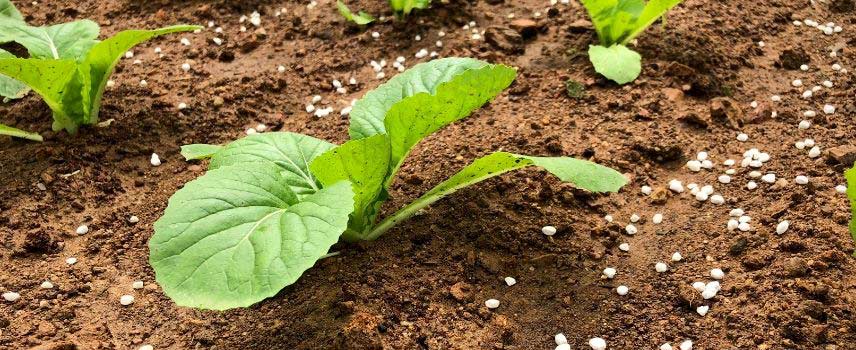
Fertiliser or soil amendment: what's the difference?
Our tips for choosing and using them!
Contents
Fertilisers and amendments aim to give plants ideal conditions to develop. They enable plants to grow in rich, fertile soil. They are important for healthy plants, which provide beautiful flowering and generous harvests. Over time, garden soil can degrade, become depleted or compact… so it is important to add materials to keep it rich and fertile. Fertilisers and amendments are two terms often confused. Discover their benefits in the garden and how to tell them apart, so you can choose what to add to your soil.
How to tell the difference between fertilisers and soil amendments?
Fertilisers aim directly to feed plants. They provide mineral elements that are not, or no longer, present in soil, supplying plants with nitrogen, phosphorus and potassium. They meet plants’ needs directly and thus prevent plants developing deficiencies. They must be applied regularly, because they are depleted as they are absorbed by plants or leached. Fertilisers can be mineral (for example as granules, sticks, or in liquid form), or organic (ground horn, dried blood…). They are also called fertilisers. They are fairly easy to use.
Amendments improve the physical structure of soil: water retention, air circulation, permeability, etc., and allow pH adjustment. They have a broad, lasting effect. Amendments do not target a particular plant, but the balance and fertility of soil. They mainly serve to nourish and improve soil. Amendments can correct soil pH, make it lighter and more permeable, improve water retention or drainage. Amendments restore a balance between sand, clay, silt and humus that make up soil. This facilitates movement of air, water and mineral elements through soil.
- Amendments can be mineral: this includes lime, which corrects pH of soils that are too acidic. It is also possible to add sand, clay, wood ash, aluminium sulfate, dolomite…
- Organic amendments (compost, manure, green manures…), by contrast, serve to nourish soil and build up humus reserves. They feed micro-organisms and sustain soil life. Organic amendments affect both structure and fertility. They have the peculiarity of being both an amendment and a fertiliser, because as they break down they gradually release minerals that will feed the plant. Mulching can also be considered an amendment, as it decomposes over time and adds organic matter to soil.
Read also
Succeeding with composting in 5 StepsWhen should fertilisers be used?
Fertilisers provide plants with mineral elements they need. Depending on their composition, they can supply three macronutrients: nitrogen (N), phosphorus (P) and potassium (K), as well as secondary elements and trace elements. Plants usually take these elements from soil, which can become depleted. Fertiliser must therefore be applied to continue feeding plants.
Fertilisers are very useful for feeding plants, but they do not improve soil fertility. They eventually disappear as they are absorbed by plants or leached. They must be applied regularly.
Fertilisers are available in solid form (granules, sticks…) or liquid.
They are mainly used to:
- Prevent or correct deficiencies
- Improve flowering, fruit or vegetable production…
- Feed potted plants or window boxes, whose resources are limited.
- Strengthen plants
- Revitalise a plant that has suffered stress or disease
Although some soil amendments also nourish plants, fertilisers are simpler and more effective at supplying a plant directly with nutrients it needs. If it has high nitrogen requirements or is deficient in that element, choose a nitrogen fertiliser; if it needs potassium, a suitable fertiliser can also be found…
Fertilisers therefore meet specific needs, and are very effective at correcting deficiencies.

Discover our advice sheet to help choose the right fertiliser whether for flower beds, vegetable garden or trees and bushes.
When should amendments be used?
Amendments have a global and lasting effect, improving physical structure of soil (soil particles) or pH. They can, for example, lighten soil, raise pH, improve drainage or increase water retention capacity… Before adding amendments, know soil type and its characteristics, and determine what needs correcting.
Because organic amendments (compost, manure…) feed soil, making it more fertile and alive, they make fertiliser applications less necessary. Moreover, unlike fertilisers, the elements they supply are not easily leached and remain available longer for plants.
Fertilisers and amendments can be considered complementary.
Some examples of uses :
| Objective | Amendment to add |
| Raise pH | Dolomite, lime, wood ash… |
| Lower pH | Sulphur or iron sulphate. Caution: apply slowly and progressively. |
| Lighten heavy, compact soil | Organic matter: compost, manure, leaf mould… or lime applications |
| Improve water retention | Organic matter: compost, manure, leaf mould… or applications of bentonite clay |
| Make soil loose and easy to work | Organic matter: compost, manure, leaf mould… |
| Improve drainage | Gravel or coarse sand (river sand) |
| Improve absorption of mineral elements and water by plants | Mycorrhizae |
However, it is important to grow plants suited to your soil. If soil is acidic, rather than trying to raise pH, better to grow ericaceous plants. Similarly, if soil is calcareous, grow plants that do well in calcareous soil. In sandy, very free-draining soil, avoid growing plants that prefer cool or moist soils, and instead choose plants adapted to drought.
- Subscribe!
- Contents
































Comments